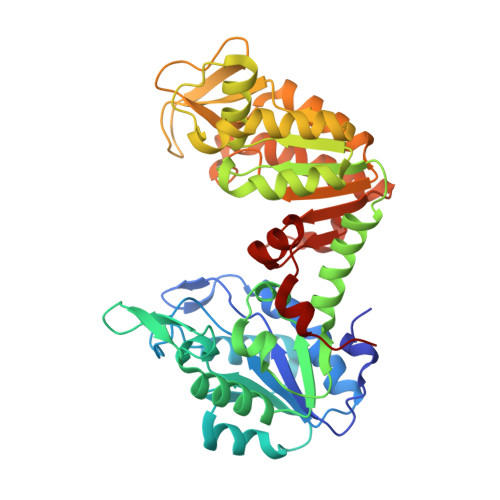A Novel Pyrazolopyrimidine Ligand of Human PGK1 and Stress Sensor DJ1 Modulates the Shelterin Complex and Telomere Length Regulation.
Bilsland, A.E., Liu, Y., Turnbull, A., Sumpton, D., Stevenson, K., Cairney, C.J., Boyd, S.M., Roffey, J., Jenkinson, D., Keith, W.N.(2019) Neoplasia 21: 893-907
- PubMed: 31401411
- DOI: https://doi.org/10.1016/j.neo.2019.07.008
- Primary Citation of Related Structures:
5NP8 - PubMed Abstract:
Telomere signaling and metabolic dysfunction are hallmarks of cell aging. New agents targeting these processes might provide therapeutic opportunities, including chemoprevention strategies against cancer predisposition. We report identification and characterization of a pyrazolopyrimidine compound series identified from screens focused on cell immortality and whose targets are glycolytic kinase PGK1 and oxidative stress sensor DJ1. We performed structure-activity studies on the series to develop a photoaffinity probe to deconvolute the cellular targets. In vitro binding and structural analyses confirmed these targets, suggesting that PGK1/DJ1 interact, which we confirmed by immunoprecipitation. Glucose homeostasis and oxidative stress are linked to telomere signaling and exemplar compound CRT0063465 blocked hypoglycemic telomere shortening. Intriguingly, PGK1 and DJ1 bind to TRF2 and telomeric DNA. Compound treatment modulates these interactions and also affects Shelterin complex composition, while conferring cellular protection from cytotoxicity due to bleomycin and desferroxamine. These results demonstrate therapeutic potential of the compound series.
- Institute of Cancer Sciences, University of Glasgow, Wolfson Wohl Cancer Research Centre, Garscube Estate, Switchback Road, Bearsden, Glasgow, G61 1QH, UK.
Organizational Affiliation:



















